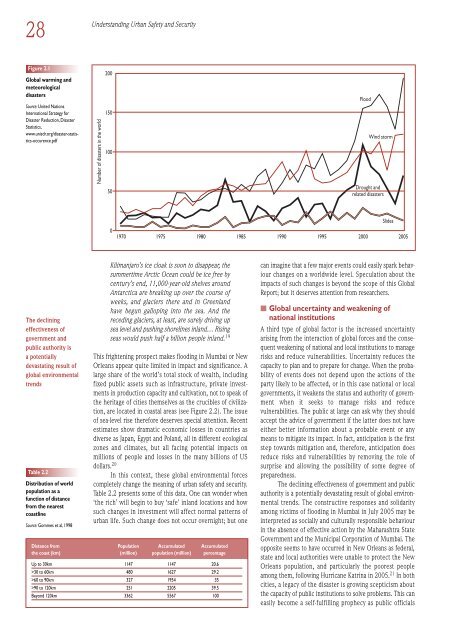Global Report on Human Settlements 2007 - PoA-ISS
Global Report on Human Settlements 2007 - PoA-ISS
Global Report on Human Settlements 2007 - PoA-ISS
Create successful ePaper yourself
Turn your PDF publications into a flip-book with our unique Google optimized e-Paper software.
28<br />
Understanding Urban Safety and Security<br />
Figure 2.1<br />
<str<strong>on</strong>g>Global</str<strong>on</strong>g> warming and<br />
meteorological<br />
disasters<br />
Source: United Nati<strong>on</strong>s<br />
Internati<strong>on</strong>al Strategy for<br />
Disaster Reducti<strong>on</strong>, Disaster<br />
Statistics,<br />
www.unisdr.org/disaster-statistics-occurence.pdf<br />
Number of disasters in the world<br />
200<br />
150<br />
100<br />
50<br />
Flood<br />
Wind storm<br />
Drought and<br />
related disasters<br />
Slides<br />
0<br />
1970<br />
1975 1980 1985 1990 1995 2000 2005<br />
The declining<br />
effectiveness of<br />
government and<br />
public authority is<br />
a potentially<br />
devastating result of<br />
global envir<strong>on</strong>mental<br />
trends<br />
Table 2.2<br />
Distributi<strong>on</strong> of world<br />
populati<strong>on</strong> as a<br />
functi<strong>on</strong> of distance<br />
from the nearest<br />
coastline<br />
Source: Gommes et al, 1998<br />
Kilimanjaro’s ice cloak is so<strong>on</strong> to disappear, the<br />
summertime Arctic Ocean could be ice free by<br />
century’s end, 11,000-year-old shelves around<br />
Antarctica are breaking up over the course of<br />
weeks, and glaciers there and in Greenland<br />
have begun galloping into the sea. And the<br />
receding glaciers, at least, are surely driving up<br />
sea level and pushing shorelines inland… Rising<br />
seas would push half a billi<strong>on</strong> people inland. 19<br />
This frightening prospect makes flooding in Mumbai or New<br />
Orleans appear quite limited in impact and significance. A<br />
large share of the world’s total stock of wealth, including<br />
fixed public assets such as infrastructure, private investments<br />
in producti<strong>on</strong> capacity and cultivati<strong>on</strong>, not to speak of<br />
the heritage of cities themselves as the crucibles of civilizati<strong>on</strong>,<br />
are located in coastal areas (see Figure 2.2). The issue<br />
of sea-level rise therefore deserves special attenti<strong>on</strong>. Recent<br />
estimates show dramatic ec<strong>on</strong>omic losses in countries as<br />
diverse as Japan, Egypt and Poland, all in different ecological<br />
z<strong>on</strong>es and climates, but all facing potential impacts <strong>on</strong><br />
milli<strong>on</strong>s of people and losses in the many billi<strong>on</strong>s of US<br />
dollars. 20<br />
In this c<strong>on</strong>text, these global envir<strong>on</strong>mental forces<br />
completely change the meaning of urban safety and security.<br />
Table 2.2 presents some of this data. One can w<strong>on</strong>der when<br />
‘the rich’ will begin to buy ‘safe’ inland locati<strong>on</strong>s and how<br />
such changes in investment will affect normal patterns of<br />
urban life. Such change does not occur overnight; but <strong>on</strong>e<br />
Distance from Populati<strong>on</strong> Accumulated Accumulated<br />
the coast (km) (milli<strong>on</strong>) populati<strong>on</strong> (milli<strong>on</strong>) percentage<br />
Up to 30km 1147 1147 20.6<br />
>30 to 60km 480 1627 29.2<br />
>60 to 90km 327 1954 35<br />
>90 to 120km 251 2205 39.5<br />
Bey<strong>on</strong>d 120km 3362 5567 100<br />
can imagine that a few major events could easily spark behaviour<br />
changes <strong>on</strong> a worldwide level. Speculati<strong>on</strong> about the<br />
impacts of such changes is bey<strong>on</strong>d the scope of this <str<strong>on</strong>g>Global</str<strong>on</strong>g><br />
<str<strong>on</strong>g>Report</str<strong>on</strong>g>; but it deserves attenti<strong>on</strong> from researchers.<br />
■ <str<strong>on</strong>g>Global</str<strong>on</strong>g> uncertainty and weakening of<br />
nati<strong>on</strong>al instituti<strong>on</strong>s<br />
A third type of global factor is the increased uncertainty<br />
arising from the interacti<strong>on</strong> of global forces and the c<strong>on</strong>sequent<br />
weakening of nati<strong>on</strong>al and local instituti<strong>on</strong>s to manage<br />
risks and reduce vulnerabilities. Uncertainty reduces the<br />
capacity to plan and to prepare for change. When the probability<br />
of events does not depend up<strong>on</strong> the acti<strong>on</strong>s of the<br />
party likely to be affected, or in this case nati<strong>on</strong>al or local<br />
governments, it weakens the status and authority of government<br />
when it seeks to manage risks and reduce<br />
vulnerabilities. The public at large can ask why they should<br />
accept the advice of government if the latter does not have<br />
either better informati<strong>on</strong> about a probable event or any<br />
means to mitigate its impact. In fact, anticipati<strong>on</strong> is the first<br />
step towards mitigati<strong>on</strong> and, therefore, anticipati<strong>on</strong> does<br />
reduce risks and vulnerabilities by removing the role of<br />
surprise and allowing the possibility of some degree of<br />
preparedness.<br />
The declining effectiveness of government and public<br />
authority is a potentially devastating result of global envir<strong>on</strong>mental<br />
trends. The c<strong>on</strong>structive resp<strong>on</strong>ses and solidarity<br />
am<strong>on</strong>g victims of flooding in Mumbai in July 2005 may be<br />
interpreted as socially and culturally resp<strong>on</strong>sible behaviour<br />
in the absence of effective acti<strong>on</strong> by the Maharashtra State<br />
Government and the Municipal Corporati<strong>on</strong> of Mumbai. The<br />
opposite seems to have occurred in New Orleans as federal,<br />
state and local authorities were unable to protect the New<br />
Orleans populati<strong>on</strong>, and particularly the poorest people<br />
am<strong>on</strong>g them, following Hurricane Katrina in 2005. 21 In both<br />
cities, a legacy of the disaster is growing scepticism about<br />
the capacity of public instituti<strong>on</strong>s to solve problems. This can<br />
easily become a self-fulfilling prophecy as public officials

















